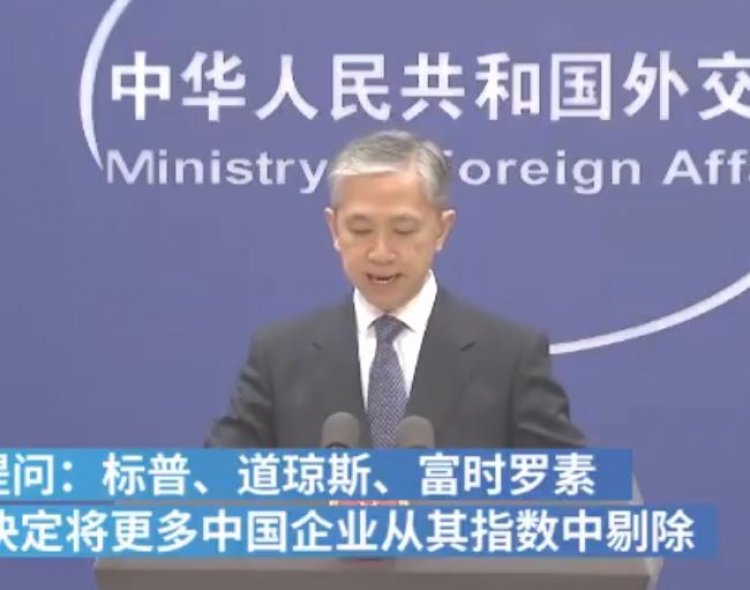China retaliation US trade blacklist
U.S. government puts 14 more Chinese firms on economic blacklist. The U.S. government is reportedly barring 14 new Chinese companies from trading on U.S. stock exchanges and blacklisting them.

The U.S. accuses the companies of disregarding human rights. The Chinese reject that.
On Friday, 14 more Chinese companies were added to the so-called U.S. blacklist for alleged human rights abuses, Reuters reported. The Chinese companies on the list will not be allowed to trade on U.S. stock exchanges.
Now, there are a total of 73 Chinese companies barred from investing in the U.S., including telecommunications equipment maker Huawei Technologies. The U.S. accuses the companies of disregarding human rights and providing the Chinese government with high-tech surveillance in China's predominantly Muslim Xinjiang province.
China rejects the allegations of genocide and forced labor in Xinjiang. It maintains the policy is necessary to root out separatists and religious extremists planning attacks. These would stoke tensions between the Muslim-majority ethnic Uighurs and the Han - China's largest ethnic group.
Beijing will defend the interests of Chinese companies affected by U.S. sanctions, the country's Foreign Ministry said. It added that the U.S. only hurts investors and itself when it attacks Chinese companies. Chinese Foreign Ministry spokesman Wang Wenbin said:
"The Chinese side will take all necessary measures to protect the legitimate rights and interests of Chinese enterprises, and rejects U.S. attempts to interfere in China's internal affairs. Excluding quality Chinese companies from the indexes will only harm the image of the indexes and cause losses to them themselves."
An opinion piece in the prominent state-run English-language Global Times promised "relentless retaliation" for the new blacklist regarding Xinjiang and Hong Kong. The article stated:
"Any sanctions against Hong Kong and mainland China will face relentless retribution. The U.S. and Europe will suffer the same losses as China from the conflict. We advise them to stand down."
The U.S. Department of Commerce has listed the Chinese companies for alleged abuses in Xinjiang. They include Shenzhen Cobber Information Technology, the Beijing-based academic institution Chinese Academy of Electronics and Information Technology, and Leon Technology. Companies from Russia were also added to the list.
The latest move shows that U.S. President Joe Biden is aiming to pressure China over what the U.S. government sees as worsening human rights abuses against the Uighur population in Xinjiang. In general, companies on the list must apply for licenses from the U.S. Department of Commerce and face strict scrutiny when asking for permission to source goods from U.S. suppliers.
Last month, the U.S. Commerce Department announced it had placed five Chinese companies on the list "for accepting or using forced labor in carrying out the People's Republic of China's campaign of repression against Muslim minorities in the Xinjiang Uighur Autonomous Region." The U.S. Department said the June action targeted the ability of the five companies, including China-based Hoshine Silicon Industry, "to gain access to raw materials, software, and technology, and is part of the U.S. government's efforts to vigorously counter China's ongoing campaign of repression against Muslim minority groups in Xinjiang."
This is not the first time the U.S. government has targeted Chinese companies linked to allegations of high-tech surveillance in Xinjiang. In 2019, the Trump administration placed some of China's leading artificial intelligence startups on its blacklist of companies for allegedly oppressing Muslim minorities.
The U.S. Commerce Department under Trump targeted 20 Chinese public security agencies and eight companies, including video surveillance firm Hikvision and leading facial recognition technologies SenseTime Group Ltd and Megvii Technology Ltd. The Commerce Department said in 2019 the companies were involved in "high-tech surveillance operations against Uyghurs, Kazakhs and other members of Muslim minority groups."
On July 9, Wang Wenbin responded to S&P, Dow Jones and FTSE Russell’s decision to exclude more Chinese companies from their index. Wang Wenbin said that this will only reduce the authority and representativeness of these indexes, which is their own loss. pic.twitter.com/hwUCBX57GX — 孫松_Sun Song (@ChinaSunSong) July 9, 2021






